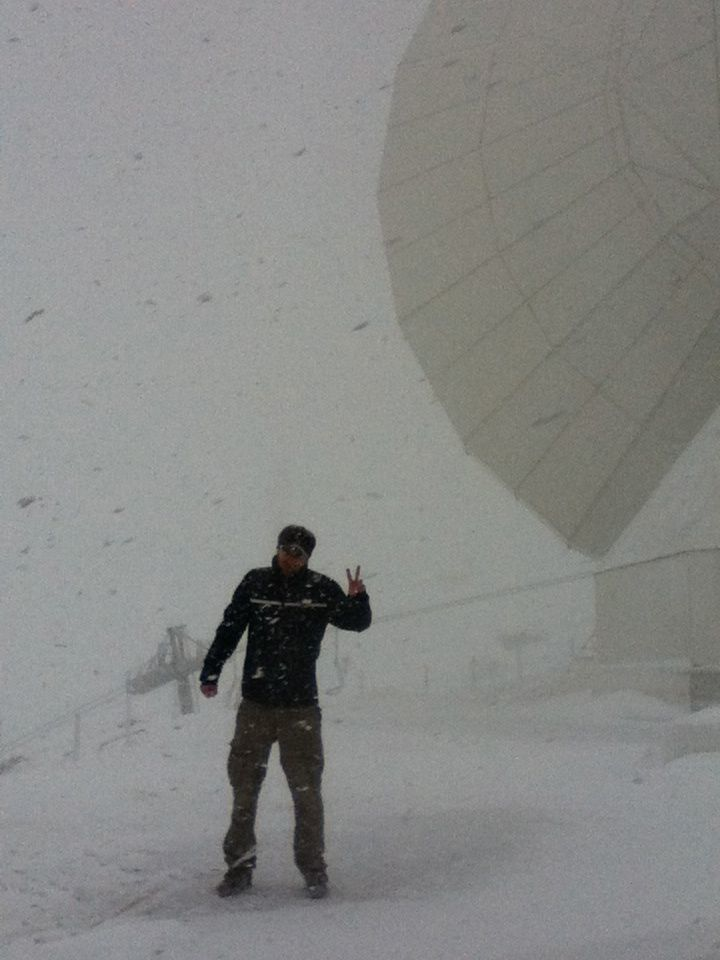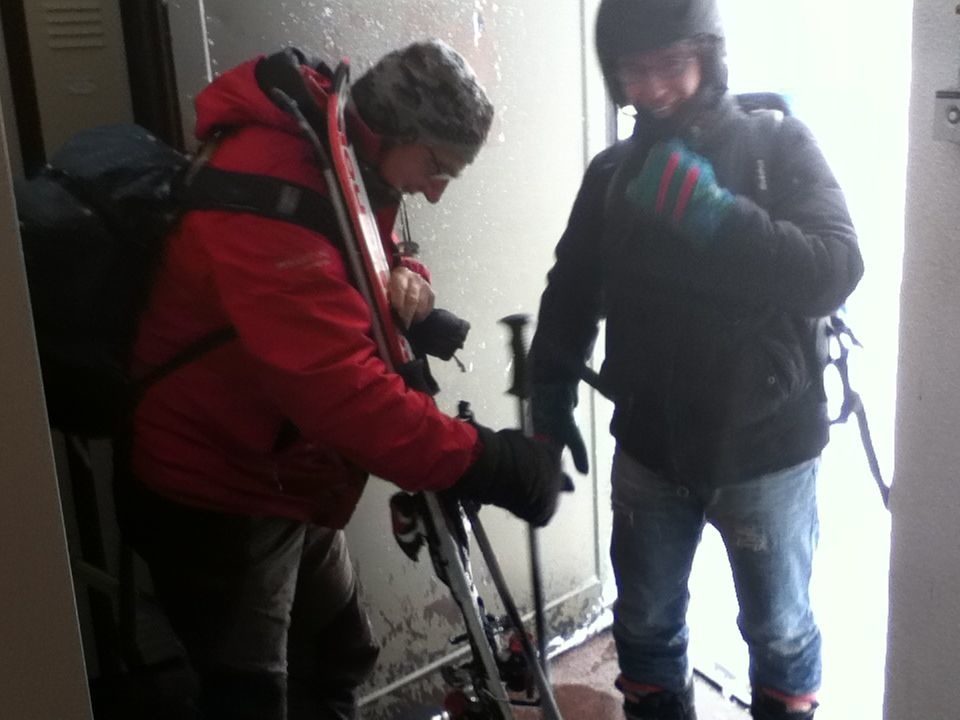January 14th 2014
Andrea Catalano come to the 30m to turn on the NIKA cryostat and checking the cool down remotely controlled from Grenoble (Alain Benoit, Alessandro Monfardini and Martino Calvo).
STATUS OF THE INSTRUMENT
9h30: Reboot of the PC NIKA and change the VNC forwarding on the router.
10h: Pumped the trap (J5=46mbar). Pumped the dilution circuit (until Jpi=3e-2mbar).
11h: Pressions stables. ZERO OF J1 IS -25mbar!!!
12h: Connected the leak detector. Residual pressure in the cryostat 6.6mbar.
12h15m: Optical alignment of the cryostat started.
12h30m: Impedance 18mbar/min at 3bar. It is maybe less w.r.t. the last run cryo (not clear from the old files). WE CONTINUE.
13h: Leak test: OK, in the 1e-9 range.Pumped ev18 for 15 minutes. It was well empty in any case. REMEMBER NOT TO TOUCH ev18 ANYMORE.
13h: Optical alignment OK.
14h: GREEN LIGHT for switching on the Pulse Tube. Mixture circulated for two hours at 3bar.
14h30m: Pulse Tube on with 900mbar.
15h30m: Lowering to 870mbar. Keep the same during the night.
23h10m: T4K=160K. Tstill=125K. Lowering the flux at 630mbar for the night.
January 15th 2014
Cooling down still going on.
STATUS OF THE INSTRUMENT
07h00m: T4K=25K. Tstill=30K. Lowering the flux at 340mbar.
09h15m: Close ev5.
10h30m: Coax connected, mppsync connected, computers on (archeops 8-9-10) in the control room
11h00m: Condensation starts.
16h00m: 100mK !!!.
17h45m: Stop Compressor
18h30m: Stop leak detecotr.
18h30m: Nitrogen refill.
18h30m: HWP modulator connected.
January 16th 2014
STATUS OF THE INSTRUMENT
08h30m: T_BM=96mK pretty stable (DeltaT_BM about 1mK over 12h), T_still=682mK (DeltaT_still about 5mK over 1h), T_4K=5.23K (DeltaT_4K about 20mK over 1h), J4 stable at 580mbar.
21h30m: T_BM=95.8mK pretty stable (DeltaT_BM about 1mK over 12h), T_still=685mK (DeltaT_still about 7mK over 1h), T_4K=5.2K (DeltaT_4K about 20mK over 1h), J4 stable at 550mbar.

Alone waiting for the rest of the NIKA gang....
January 17th 2014
Nicolas joins the Telescope at 10am. Preparing tomorrow observations (pako, pipeline, etc...)
STATUS OF THE INSTRUMENT
08h30m: T_BM=95mK pretty stable (DeltaT_BM about 1mK over 12h), T_still=655mK (DeltaT_still about 6mK over 1h), T_4K=4.91K (DeltaT_4K about 80mK over 1h), J4 stable at 537mbar.
11h30m: All the scripts pako and the NIKA catalogue copied in the new account nikaw-13 (to be used for the poll).
14h30m: Refill Nitrogen in the trap done.
14h30m: Problems to connect to the mppsync. Maybe memory card burnt?
20h20m: T_BM=94.7mK pretty stable (DeltaT_BM about 0.5mK over 12h), T_still=650mK (DeltaT_still about 3mK over 1h), T_4K=4.88K (DeltaT_4K about 10mK over 1h), J4 stable at 530mbar.
January 18th 2014
Alain and Alessandro join the telescope skiing in the blizzard!

We do all this only for science.....
STATUS OF THE INSTRUMENT
07h50m: T_BM=94.5mK pretty stable (DeltaT_BM about 0.6mK over 12h), T_still=655mK (DeltaT_still about 5mK over 1h), T_4K=4.89K (DeltaT_4K about 8mK over 1h), J4 stable at 535mbar.
09h30m: mppsync connection problems repaired by changing the memory card.
12h30m: Window on cryostat REMOVED. Modulator (without polarizer and plate) mounted and centered approximately in front of the cryostat. Question is leave it or not for total power observations ?
15h (Alessandro): OPTICAL RESPONSE ESTIMATION On the 2mm array, from window closed to 300K (window open, looking at the cabin), the frequency shift is 105kHz. VERY SIMILAR (was around 100kHz) TO WHAT WE HAD OBSERVED FOR RUN 6 (see daily report in run6). In Grenoble this array exhibited a shift of about 180kHz between 80K and 300K, equivalent to 0.8kHz/K. So, it seems that the windows is only equivalent to 300-100/0.8=175K. On the 1mm array, from window closed to 300K (window open, looking at the cabin), the frequency shift is around 320kHz !! In the last run 6 we had only 150KHz. Remember we had at that time one additional filter 9cm-1 that's now removed. So the signal is twice that run6. But the noise should be higher due to the fact that the resonances are shallower now. Should be very sensitive to the tau. In very good sky I expect the noise on RF_dIdQ to go down fast. PAY ATTENTION, THESE NUMBERS ARE ASSUMING THAT THE KID DID NOT DRIFT TOO MUCH BETWEEN 12h30 when we opened the window and 15h when we re-tuned. It's a reasonable assumption. See later for the verification. TO CONFIRM, we TRIED WITH LN2. The shifts from window to LN2 are +410kHz at 1mm and +130KHz in this case, confirming that the values we have said. So, the window is around 180K and the response of the arrays are roughly 0.8KHz/K for the 2mm and 2.5KHz/K for the 1mm array.

In the picture above (y-axis: delta_f in KHz of the resonances; x-axis: time) we see the three situations tested today. Azure: reference (param) with the window ON; Red: array 1mm; Blue: array 2mm. Start and end: no window, looking at the 300K in the cabin. Step in the middle: LN2 in front of the pupil (a bit farther than the pupil wrt the cryostat).
